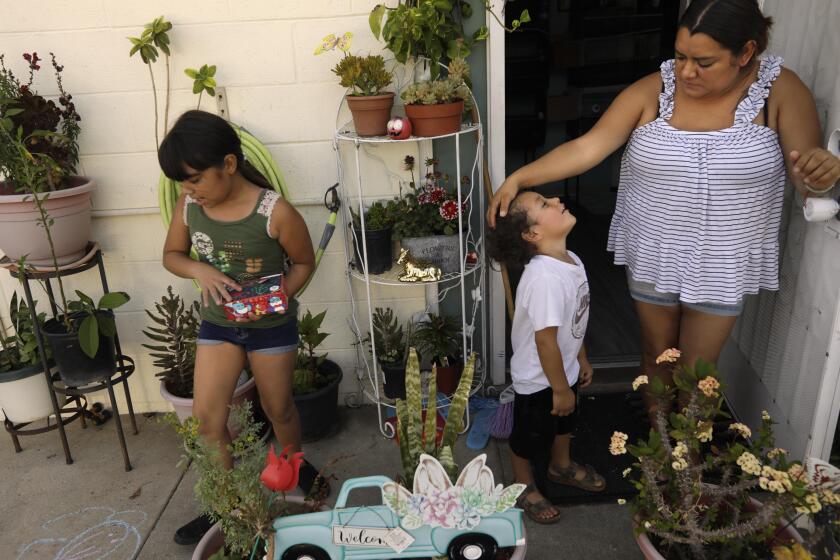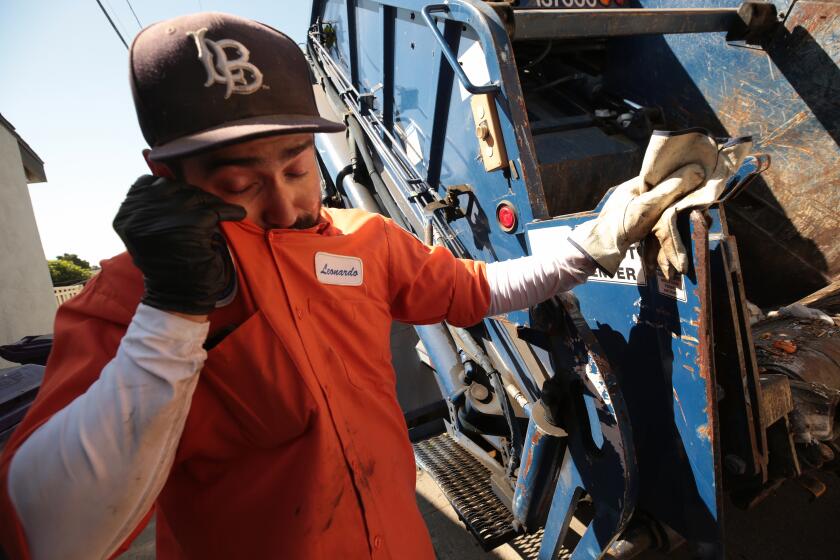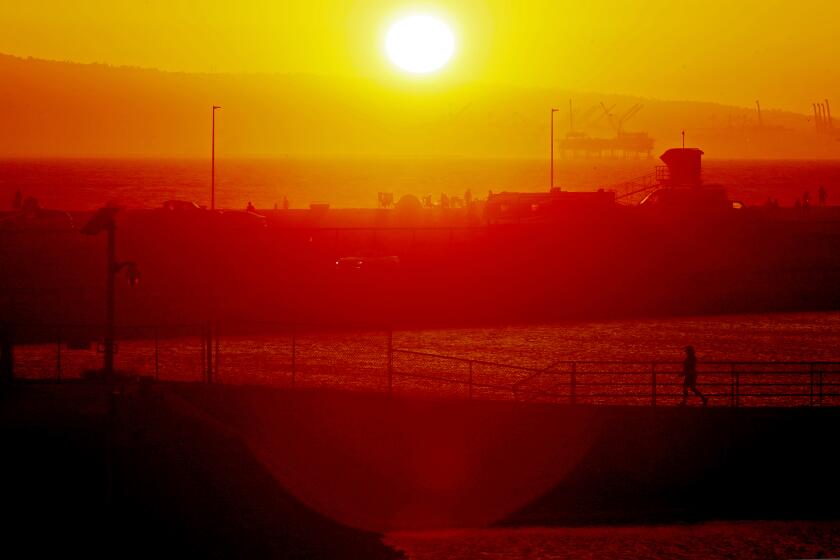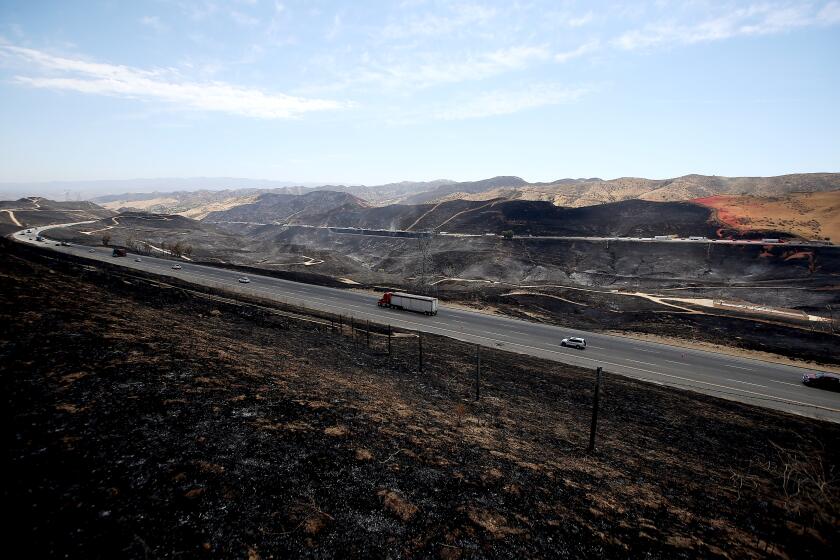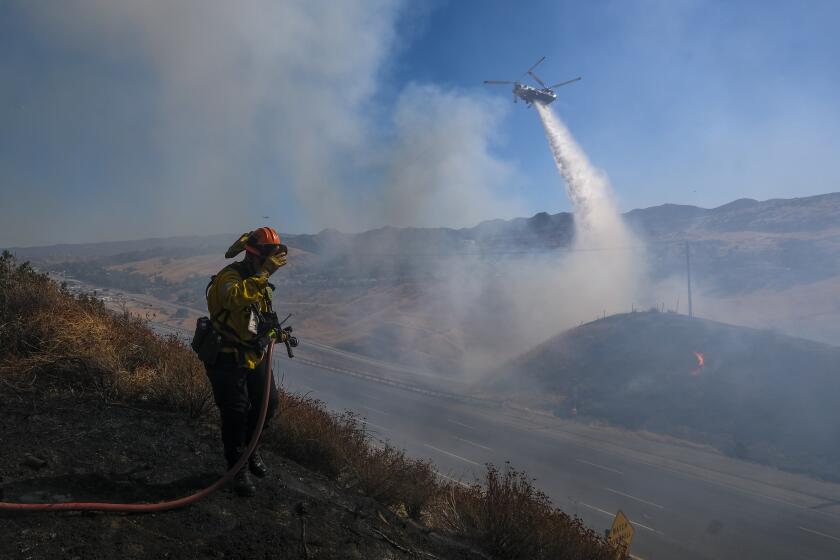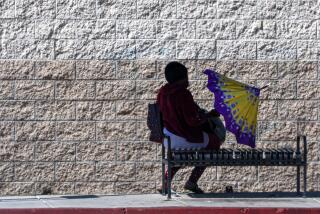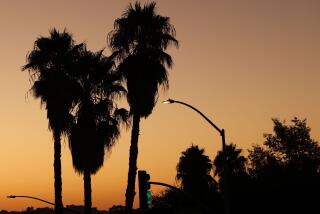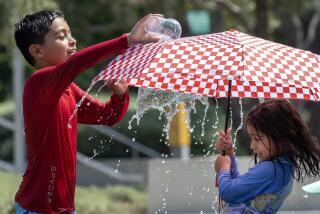Even higher temps expected on Labor Day as SoCal heat wave sets records

- Share via
How to cope with the extreme heat baking Southern California is likely to weigh further on residents’ minds Monday amid temperatures expected to rise even more, bringing bad air quality and increasing the risks of power outages and potentially deadly fires on the Labor Day holiday.
Highs between 105 and 110 degrees are expected across broad swaths of the San Fernando, San Gabriel and Santa Clarita valleys, as well as communities in lower mountain elevations, said Joe Sirard, a meteorologist at the National Weather Service’s Oxnard office. Thunderstorms, isolated showers and flash flooding are also forecast for the mountain and desert areas through Tuesday night.
The weather service is forecasting heat advisories and excessive heat warnings through Tuesday and is warning against heat illness.
Forecasters say the Antelope Valley could see temperatures as high as 113 degrees during the ongoing heat wave.
Sunday’s heat broke temperature records across the Southland. In Los Angeles County, Burbank tied its old record of 110 degrees set in 1984. In Long Beach, temperatures reached 109, surpassing the record of 107 degrees from 1988.
Shorts, sundresses and sandals were in abundance Sunday afternoon as searing temperatures baked the Grand Central Market in downtown Los Angeles.
Undeterred by the 103-degree heat, family and friends of Cesar Aguilar celebrated his 47th birthday at the popular market, laughing and drinking beers and eating seafood.
What are heat-related illnesses and how are they treated? Are they preventable or inevitable? We talked to health experts for the answers.
“It’s hot here and it’s hot there, so it doesn’t matter where you go,” Aguilar said, referring to the 99-degree heat at his home in Tustin. “So, what can you do but have a cold drink?”
The California Independent System Operator, which operates the state’s power grid, said the extended heat wave has driven the demand for electricity to the brink of overload. As of Sunday afternoon, that demand stood at 42,480 megawatts and will probably climb to 48,817 megawatts Monday, then surpass 50,000 megawatts Tuesday, just shy of the all-time record set in 2006.
Partial outages at three gas-fired electricity plants, including those in Redondo Beach and El Segundo, hampered power generation Sunday, said Mark Rothleder, the ISO’s senior vice president and chief operating officer.
As Angelenos sweat through extreme temperatures, workers are doing whatever they can to cool off, from drinking two gallons of water to wearing ice packs and a fan.
The system operator is maintaining a statewide Flex Alert, and an Emergency Energy Alert that marshals all available resources to alleviate the power crunch across the state remains in effect. The watch will probably be elevated to a higher status Monday, which could mean bringing in backup generators and activating discounts for customers who reduce their power usage. Flex Alerts call for consumers to reduce their energy use from 4 to 9 p.m. to help ease stress on the power grid and to avoid potential rolling blackouts.
“Tomorrow is the first day where the likelihood of getting further into emergency conditions increases significantly and the chances of interruptions to electrical service are higher than they have been so far,” Elliot Mainzer, president of the California grid, said at a Sunday afternoon news conference. “We are taking a wide number of steps in cooperation with the state agencies, with the utilities … to make sure we’re as prepared as possible.”
No one had to tell Ella and Kaleb Berhe it was time to avoid the worst of the heat wave. The couple drove from their home in East Hollywood to Redondo Beach on Sunday to meet with friends by the water.
Perched on unshaded beach chairs in the sand, they said it was difficult to stay cool at their home while trying to comply with the Flex Alert.
Toward a more sustainable California
Get Boiling Point, our newsletter exploring climate change, energy and the environment, and become part of the conversation — and the solution.
You may occasionally receive promotional content from the Los Angeles Times.
“At 4 p.m. we’re supposed to turn it up to 78, but it’s hard to follow because we have a dog. We turn it up to 77 at 4,” Ella Berhe, 37, said. “There’s not really a good way to beat the heat. We have a hose, but we don’t want to use water. We turn fans on.”
Ella Berhe works at UCLA Medical Center in Santa Monica and said she’s used to significantly cooler temperatures on the Westside. But when she got off the night shift at 7 a.m. Sunday, it was already 88 degrees outside.
“That’s unprecedented in Santa Monica. It felt wrong,” she said. “This isn’t right. Climate change is happening.”
A forecast in the high 90s for their home in San Pedro also drove Hector Esparza, his pregnant wife and two children to Redondo Beach, where they found some relief.
The high-pressure system over most of California is expected to bring record-breaking temperatures, part of a “self-perpetuating” system that is becoming more extreme as climate change worsens.
“The house is super-hot — probably in the mid-90s — so rather than spending money on the A/C or anything to make us cool, we just came to the beach,” he said. “The first thing we did was jump in the water and get fresh.”
Esparza, 48, said he is trying to reduce his power consumption in response to calls for Californians to reduce energy use during the heat wave.
“We’re trying to cooperate with everything because if everyone has the A/C on something is going to happen,” he said. “So I told my wife let’s just go to the beach and save some money and energy.”
In Ventura County, Camarillo saw temperatures climb to 106, wiping out the old record of 93 set in 1961. In Oxnard, temperatures reached 101 degrees, beating the record high of 96 degrees also from 1961.
“Overall, it looks like the peak is today and tomorrow and then very slightly cooler Tuesday and Wednesday, but still excessively hot,” meteorologist Sirard said.
It’s really, really hot in Southern California, so catch up on some climate change reading, plus more from the week in Opinion.
Persistent hot, dry conditions statewide are of particular concern to firefighters.
The Mill and Mountain fires in Siskiyou County near the California-Oregon border have already burned more than 10,000 acres, according to the state Department of Forestry and Fire Protection. The Mill fire, which has burned 4,254 acres, is 40% contained but left two people dead in Weed. Their bodies were recovered Sunday.
Meanwhile, the Mountain fire has burned 8,896 acres and is 10% contained.
In Los Angeles County, the Route fire, which started Wednesday in the Castaic area, has burned 5,208 acres and was 96% contained as of Sunday evening, according to Cal Fire.
The increasing danger of new wildfires prompted the state Office of Emergency Services to initiate what agency spokesman Brian Ferguson called the largest “pre-positioning event” in state history, readying fire engines, water tenders and other firefighting resources in 20 counties.
Extreme dryness, soaring temperatures and frequent wildfires are increasing the risk for fire crews — and it will likely get worse in years to come.
Jon Heggie, a Cal Fire battalion chief, said the goal is to extinguish most fires before they reach 10 acres.
“We want to quickly identify and put out fires where they start,” he said. “We know that these heat domes have been an issue in the past, and if a fire does start we want to be in position.”
Inland and valley areas are especially vulnerable to the heat and the potential for fires. The temperature in Woodland Hills in the San Fernando Valley was expected to peak at 113 degrees Sunday before falling to 111 on Monday, Sirard said. Lancaster had a high of 110 degrees Sunday and forecasters expect highs of 112 or 113 degrees Monday, 110 to 112 on Tuesday and 109 on Wednesday, Sirard said.
The extreme temperatures are short of the record 120 degrees for all of L.A. County, recorded two years ago in Woodland Hills, he said.
Still, state officials and meteorologists warn of the health dangers heat has for elderly people and those with underlying health conditions. They advised such people to stay inside or go to designated cooling centers, as well as signing up for county emergency alerts to get the latest information on heat and fire incidents.
“Be diligent with neighbors and friends and people who are at high risk of heat illness,” Ferguson said. “Check on them, support them.”
More to Read
Sign up for Essential California
The most important California stories and recommendations in your inbox every morning.
You may occasionally receive promotional content from the Los Angeles Times.

